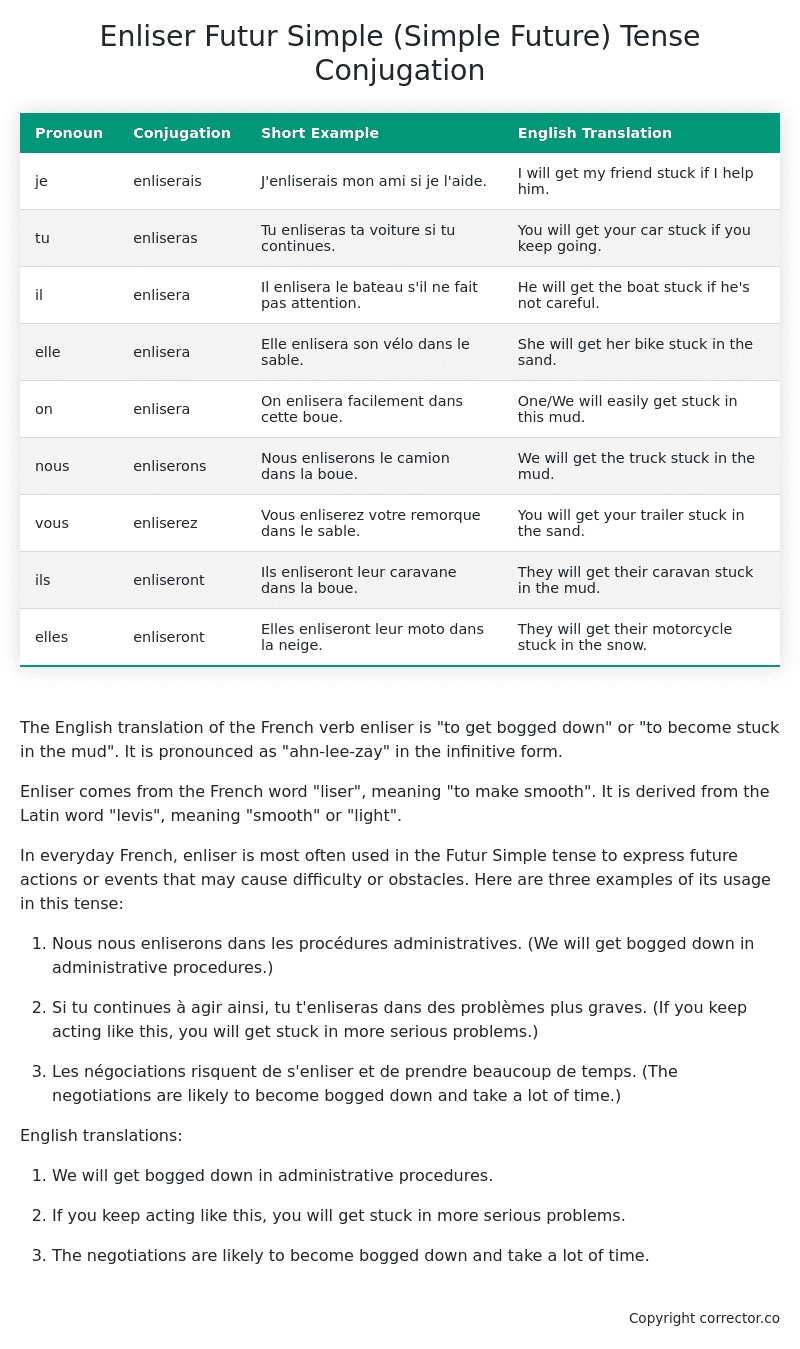Futur Simple (Simple Future) Tense Conjugation of the French Verb enliser
Introduction to the verb enliser
The English translation of the French verb enliser is “to get bogged down” or “to become stuck in the mud”. It is pronounced as “ahn-lee-zay” in the infinitive form.
Enliser comes from the French word “liser”, meaning “to make smooth”. It is derived from the Latin word “levis”, meaning “smooth” or “light”.
In everyday French, enliser is most often used in the Futur Simple tense to express future actions or events that may cause difficulty or obstacles. Here are three examples of its usage in this tense:
-
Nous nous enliserons dans les procédures administratives. (We will get bogged down in administrative procedures.)
-
Si tu continues à agir ainsi, tu t’enliseras dans des problèmes plus graves. (If you keep acting like this, you will get stuck in more serious problems.)
-
Les négociations risquent de s’enliser et de prendre beaucoup de temps. (The negotiations are likely to become bogged down and take a lot of time.)
English translations:
-
We will get bogged down in administrative procedures.
-
If you keep acting like this, you will get stuck in more serious problems.
-
The negotiations are likely to become bogged down and take a lot of time.
Table of the Futur Simple (Simple Future) Tense Conjugation of enliser
| Pronoun | Conjugation | Short Example | English Translation |
|---|---|---|---|
| je | enliserais | J’enliserais mon ami si je l’aide. | I will get my friend stuck if I help him. |
| tu | enliseras | Tu enliseras ta voiture si tu continues. | You will get your car stuck if you keep going. |
| il | enlisera | Il enlisera le bateau s’il ne fait pas attention. | He will get the boat stuck if he’s not careful. |
| elle | enlisera | Elle enlisera son vélo dans le sable. | She will get her bike stuck in the sand. |
| on | enlisera | On enlisera facilement dans cette boue. | One/We will easily get stuck in this mud. |
| nous | enliserons | Nous enliserons le camion dans la boue. | We will get the truck stuck in the mud. |
| vous | enliserez | Vous enliserez votre remorque dans le sable. | You will get your trailer stuck in the sand. |
| ils | enliseront | Ils enliseront leur caravane dans la boue. | They will get their caravan stuck in the mud. |
| elles | enliseront | Elles enliseront leur moto dans la neige. | They will get their motorcycle stuck in the snow. |
Other Conjugations for Enliser.
Le Present (Present Tense) Conjugation of the French Verb enliser
Imparfait (Imperfect) Tense Conjugation of the French Verb enliser
Passé Simple (Simple Past) Tense Conjugation of the French Verb enliser
Passé Composé (Present Perfect) Tense Conjugation of the French Verb enliser
Futur Simple (Simple Future) Tense Conjugation of the French Verb enliser (this article)
Futur Proche (Near Future) Tense Conjugation of the French Verb enliser
Plus-que-parfait (Pluperfect) Tense Conjugation of the French Verb enliser
Passé Antérieur (Past Anterior) Tense Conjugation of the French Verb enliser
Futur Antérieur (Future Anterior) Tense Conjugation of the French Verb enliser
Subjonctif Présent (Subjunctive Present) Tense Conjugation of the French Verb enliser
Subjonctif Passé (Subjunctive Past) Tense Conjugation of the French Verb enliser
Subjonctif Imparfait (Subjunctive Imperfect) Tense Conjugation of the French Verb enliser
Subjonctif Plus-que-parfait (Subjunctive Pluperfect) Tense Conjugation of the French Verb enliser
Conditionnel Présent (Conditional Present) Tense Conjugation of the French Verb enliser
Conditionnel Passé (Conditional Past) Tense Conjugation of the French Verb enliser
L’impératif Présent (Imperative Present) Tense Conjugation of the French Verb enliser
L’infinitif Présent (Infinitive Present) Tense Conjugation of the French Verb enliser
Struggling with French verbs or the language in general? Why not use our free French Grammar Checker – no registration required!
Get a FREE Download Study Sheet of this Conjugation 🔥
Simply right click the image below, click “save image” and get your free reference for the enliser Futur Simple tense conjugation!

Enliser – About the French Futur Simple (Simple Future) Tense
Formation of Futur Simple
For regular -er verbs (e.g., parler – to speak)
For regular -ir verbs (e.g., finir – to finish)
For regular -re verbs (e.g., vendre – to sell)
Common Everyday Usage Patterns
Conditional Statements
Interactions with Other Tenses
Futur Antérieur
Conditional
Present
Summary
I hope you enjoyed this article on the verb enliser. Still in a learning mood? Check out another TOTALLY random French verb conjugation!


